From Provincetown, Massachusetts, to Guerneville, California, America’s queer summer enclaves have a long history as safe spaces favored by the LGBTQ community for prejudice-free getaways. This summer, local businesses are reinventing themselves as new kinds of safe spaces to meet the demands of the on-going health crisis. Whether their ingenuity will be enough to weather the financial impact of a strained tourist season remains to be seen.
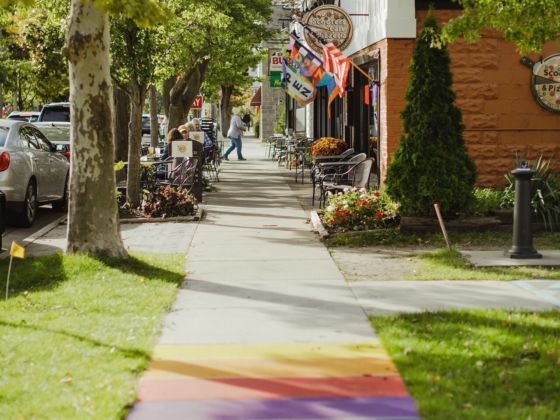

How Iconic LGBTQ Summer Spots in the US Are Reinventing Their Businesses
“The economy, in general, is hurting, but small towns like ours are hurting even more,” says Anthony Fuccillo, Provincetown’s Director of Tourism. “There aren’t chain stores here. It’s all about these privately owned, small businesses that are incredibly curated by the owners.”
As LGBTQ-friendly businesses suffer, it’s important for queer folx to support the businesses that historically support them. “Visitors and tourists might not see it, but they’re visiting a local economy when they come here for vacation,” says Fuccillo. With a slump in travel, these summer communities are losing a critical part of their economic engine.
To provide support, Fuccillo asks people to shop local. “And when I say shop local, I don’t only mean shop in your hometown, but come to a small town like Provincetown and shop here.”
“I think of what’s going on in this world and how we all need to come together as human beings,” says Fuccillo. “[Provincetown] is a place where people do that.”
The other towns on America’s rainbow-hued roster of summer retreats are no different. Here are a few of the resourceful businesses leading the charge and a handful of responsible ways to help them survive the uncertainty caused by the pandemic.
Saugatuck Center for the Arts — Saugatuck, Michigan
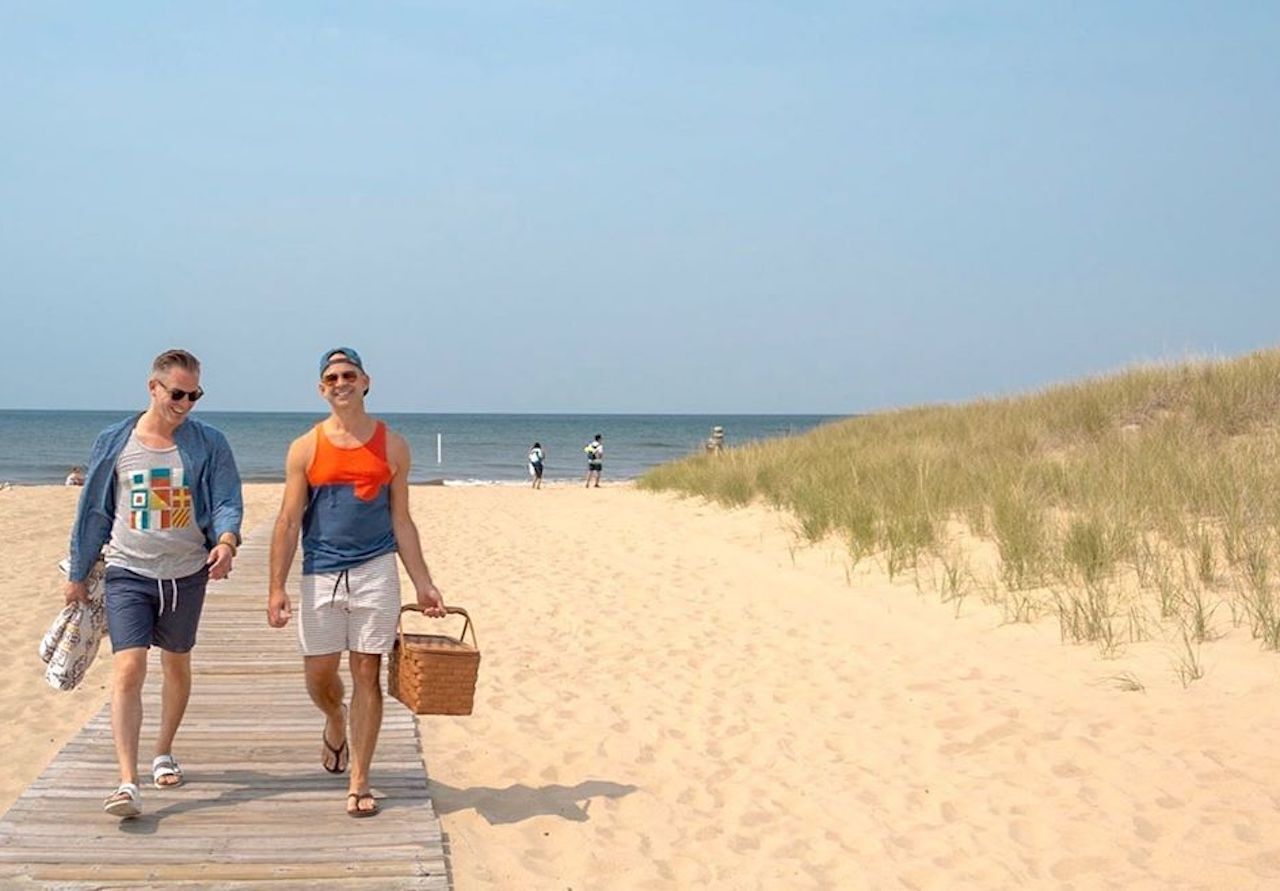
Photo: SaugatuckCVB/Facebook
Picture-perfect Saugatuck and the neighboring town of Douglas have attracted artists for over a hundred years, and today, the pandemic is putting their creative minds to the test. Luckily, the folks running the show are ready for the challenge.
“I feel like this is a summer of half a loaf,” says Kristin Armstrong, executive director of the Saugatuck Center for the Arts (SCA), “and half a loaf is better than no loaf, doggonit.”
SCA — which regularly serves up Broadway-caliber performances at the Mason Street Warehouse along with world-class art exhibitions, educational programming for kids, and even a weekly farmers market — has already reimagined their summer offerings to meet the demands of the on-going health crisis.
Much of their “2.0 programming,” as Armstrong likes to call it, is thanks to an outdoor deck prophetically built last winter. Fully equipped with a thrust stage facing the parking lot, the complex is primed for performances under the stars. “We thought maybe we’d use this once this summer,” Armstrong admits, “but now we’re going to be using it maybe seven, eight, or nine times.”
The Center will make use of its newest architectural edition with a summer concert series that’s BYOC (bring your own chair). “We’ll make sure we have everyone appropriately spaced so you can feel safe, comfortable, and enjoy some outdoor entertainment,” says Armstrong. “Otherwise, there’d be no entertainment — and that, my dear, would be a tragedy.”
Like most communities around the US, open-air experiences are the name of the game this season. The Dunes — one of the country’s largest gay resorts — has turned its complex inside-out to offer drinks and dancing while indoor service is suspended. Owners of the retail store Landsharks have donned Katy Perry-style shark suits and danced door-to-door delivering orders. Saugatuck’s best selling point this summer, however, is its abundance of offerings for outdoor enthusiasts.
“[Lake Michigan] is right there, we’ve got incredible dunes, beaches, and woodlands, and we’re smack in the middle of the Michigan fruit belt,” boasts Armstrong. “We’ve got amazing farm-to-table food, great distilleries, craft breweries, and vintners.”
The thing visitors will miss most in Saugatuck this summer is physical connection, but Armstrong remains hopeful. “People are saying, ‘We’re gonna double down next year; we’re gonna hug like there’s no tomorrow,'” she beams.
Physical distancing aside, the reason this tiny Michigan town has been a welcoming spot for LGBTQ travelers remains. “Saugatuck gives people permission to be who they want to be instead of who they’re expected to be,” says Armstrong. “Drive to Saugatuck. We have space, we know how to do it, and we promise – we won’t hug you this summer. We’ll save it for next year.”
Highlands Resort — Guerneville, California
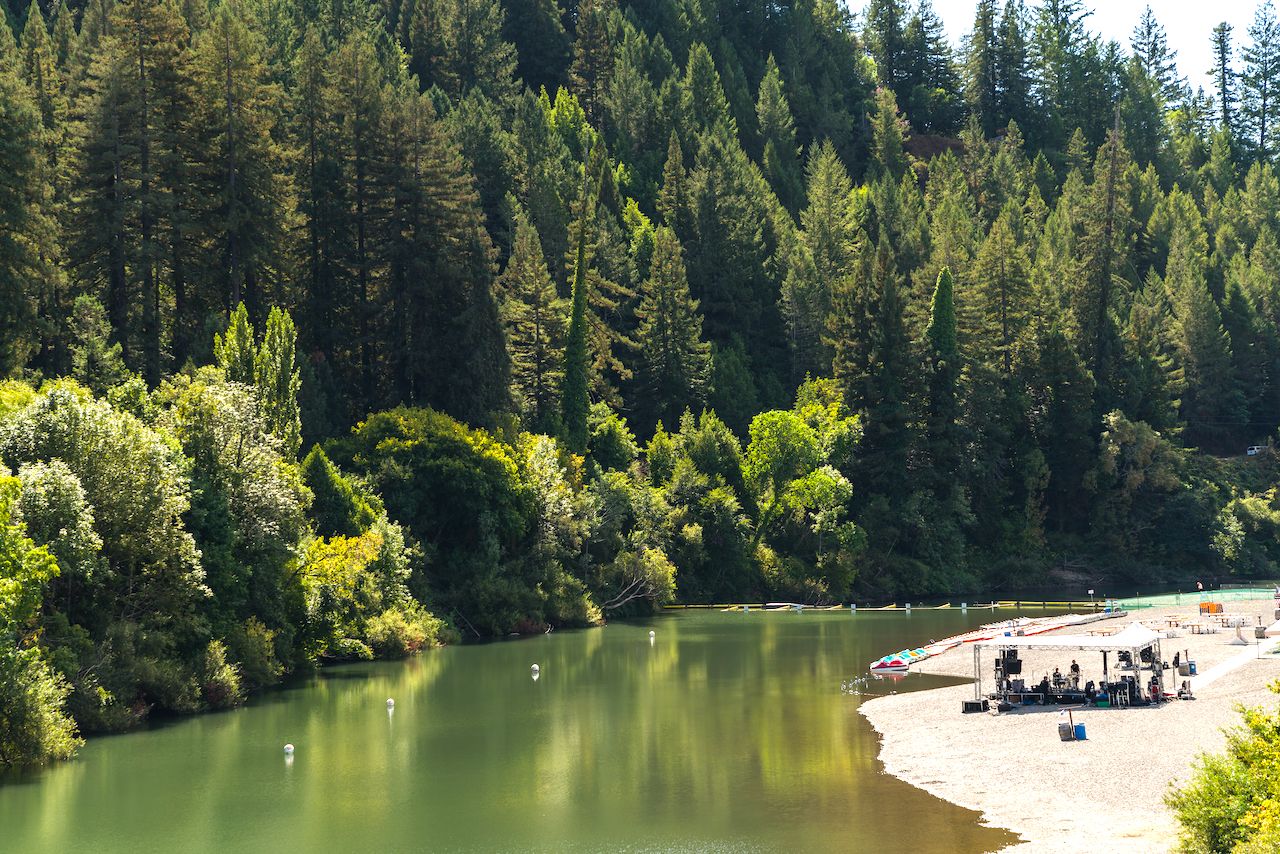
Photo: Pedro Gutierrez/Shutterstock
Guerneville, an LGBTQ outpost two hours north of San Francisco, is no stranger to calamity. “Last year, we had floods, we had fires, we had our power shut off for fear of fires, and then, of course, the pandemic this spring. It’s been tough,” admits Lynette McLean, who owns the ‘straight-friendly,’ queer-loving Highlands Resort near the Russian River.
McLean has called Guerneville home for the past 25 years, and floods are to be expected. “When the waters come up, you get these islands of neighbors,” she says. ” Each little neighborhood has a sense of community, and when times are tough, we all band together for a larger sense of support.”
When the pandemic shut down their small town, locals did what they do best – take care of one another. “A lot of restaurants in Sonoma County started making meals for people who couldn’t get out or couldn’t cook or were homeless,” says McLean. “People that bake were bringing goodies to their neighbors. It’s been sweet.”
While business at the resort is going well – “right now, the first week I have a room available for a weekend stay is in mid-August,” she says triumphantly – it’s certainly far from ordinary. “We’ve had to close down a lot of the resort’s communal aspects, which is troubling, because what we really like about our resort is that people come, make friends, and share meals. That’s such a valuable part of it.”
McLean warns guests that this isn’t the “party at the pool year. It’s the shelter at our place, rather than your place kind of year.” Party or not, it’s still worth packing a swimsuit in your suitcase. “We’ve got crop circles around our lounge chairs at the pool, and everybody’s safely distanced,” she assures.
For those fearing cabin fever, the area’s bucolic bounty is still worth the trek. McLean recommends making a trip to the Pacific Coast, or kicking back to enjoy the Highland’s two-and-a-half acres of land. “Wineries are still doing tastings by appointment so they can space people appropriately,” she adds. “There’s a lot of craft brews, small distilleries, and places that make cheese, too.”
Like any summer town, most Guerneville businesses make their money in summer in preparation for winter. “For a lot of businesses, there’s not a lot of wiggle room,” McLean warns, meaning that owners will undoubtedly welcome outsiders. Without them, Sonoma County’s queer island could very well disappear with the next big flood.
McLean has just one ask for out-of-towners: “Do your grocery shopping where you live and bring it with you. Don’t overwhelm the grocery store in town.” And, of course, wear a mask. But that’s just business as usual.
Aqua Bar & Grill — Rehoboth Beach, Delaware
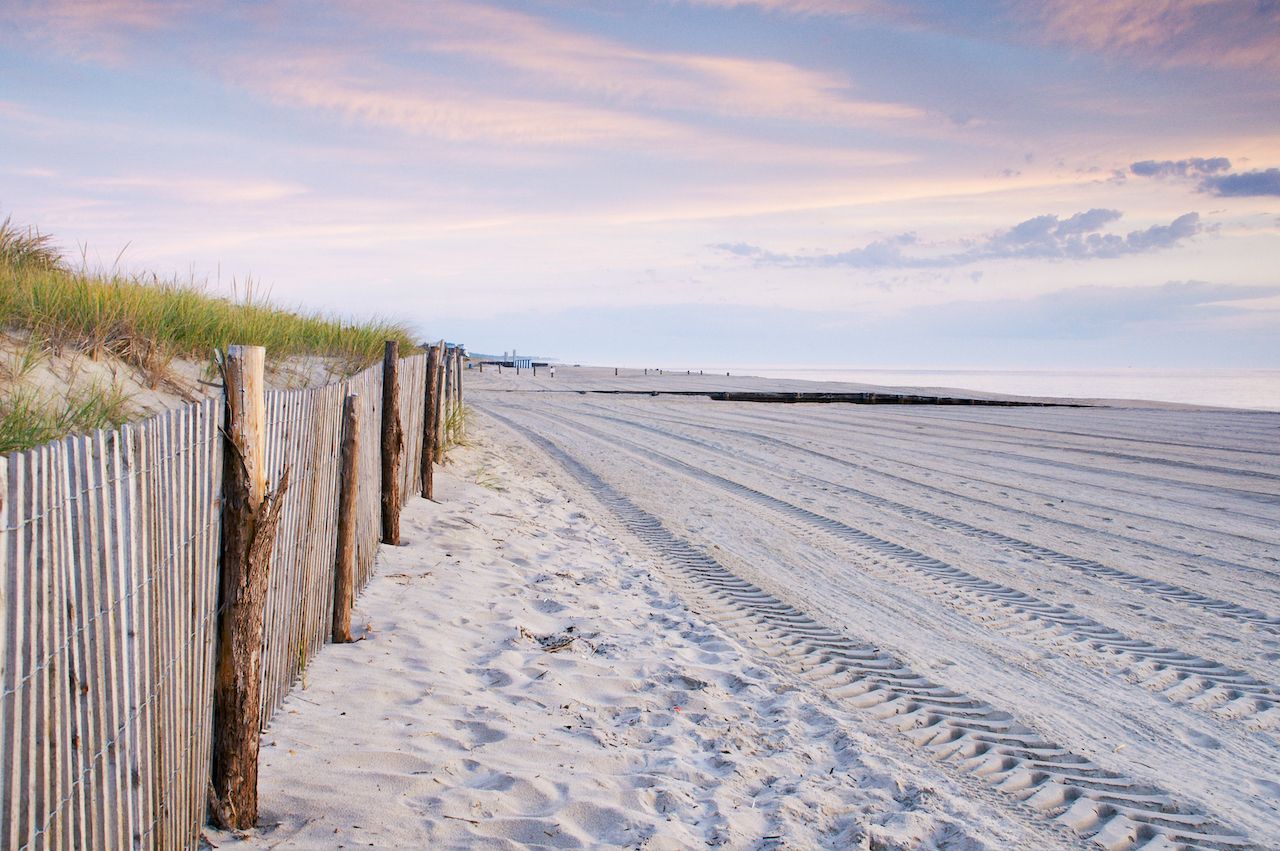
Photo: Bruce Goerlitz Photo/Shutterstock
Rehoboth is a Hebrew word that roughly translates to ‘plenty of room,’ or as Tyler Townsend puts it, “all are welcome.” It’s also a seaside town in Delaware that’s been a refuge for the LGBTQ community since the 1940s. Townsend, a Rehoboth native, says, “It’s a unique place where people from different places with different views come together, put their differences aside, and relax at the beach.”
Although the town’s year-round population is only 1,500, it swells to nearly 25,000 between Memorial and Labor Day. This year, however, is a “sad situation,” says Townsend. “It’s not the same.”
Townsend became a co-owner of The Pines, a local farm-to-table tavern, two years ago, and purchased the queer-friendly Aqua Bar & Grill last summer. “During a normal summer at Aqua, the outdoor space would fill with 200 people,” he says. People would grab a drink and mingle among the crowd, “but now, you’re stuck at your table.”
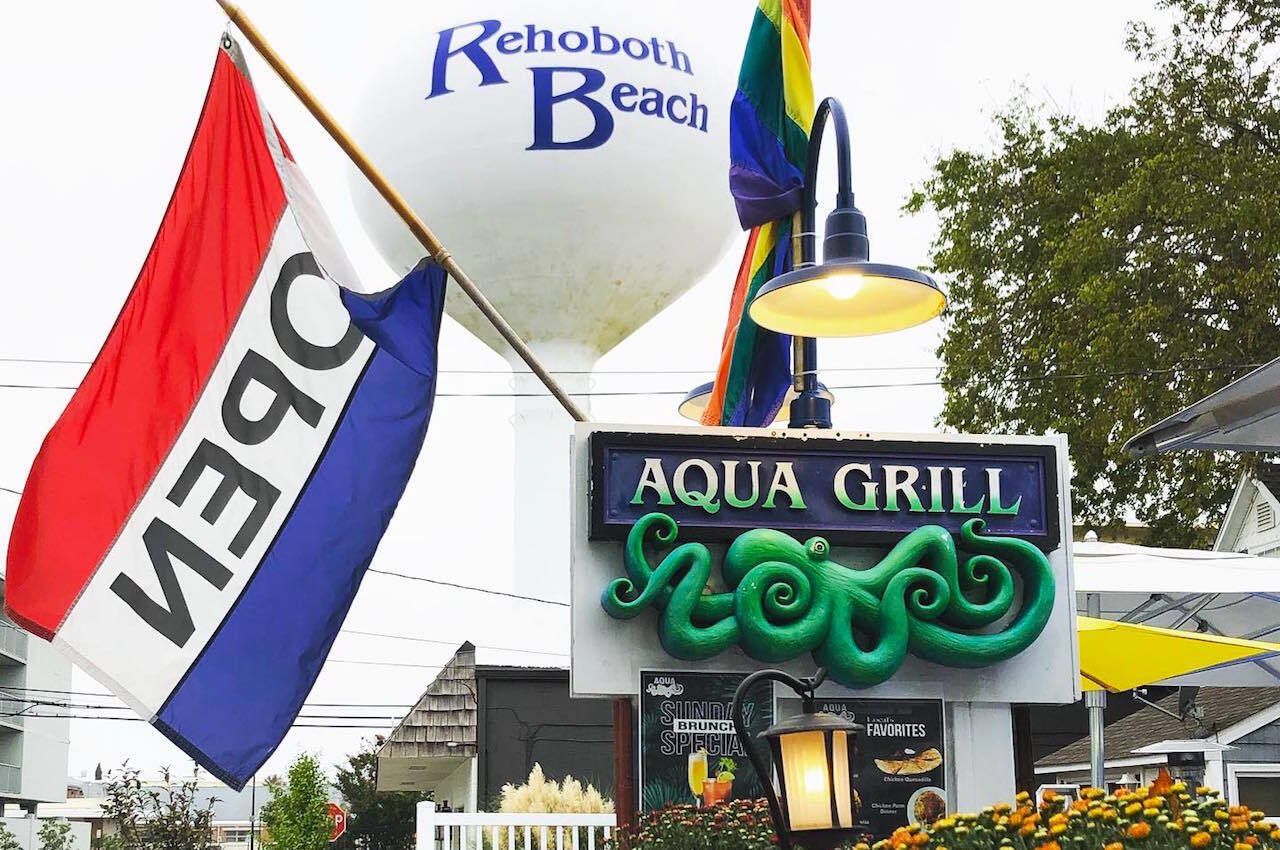
Photo: AquaGrill Reho/Facebook
The Pines and Aqua are doing their best to adapt. “At both places, we have a ton of outdoor space; Aqua has the biggest outdoor space in Rehoboth,” says Townsend. “We put our tables eight feet apart, we have table service for everyone, and we’re taking extra steps with safety and sanitation.” In addition to complying with state guidelines, The Pines is hosting a drag brunch for the first time, and Aqua will have a DJ spinning tunes for a seated tea from 5:00 PM — 8:00 PM on Saturday and Sunday to provide entertainment and “give the performers some work.”
While both restaurants have been adept at reinventing themselves, it isn’t easy. “If you’re only doing 40-50% of what you were doing last year, it’s financially tough,” Townsend admits. Fortunately, “the community in Rehoboth has rallied around each other,” he adds. Local restaurants even started an email chain to ensure everyone is on the same page with messaging and protocols. “Everyone wants to help each other out, get through this, and succeed.”
With the immense amount of work local business owners have put into preparing for visitors this summer, Townsend still stands firmly by the meaning of Rehoboth. “We’d love to have you this summer,” he says. “All we ask is that you respect what the state and town have put in place so we can make it through this together.”
Adam’s Nest — Provincetown, Massachusetts
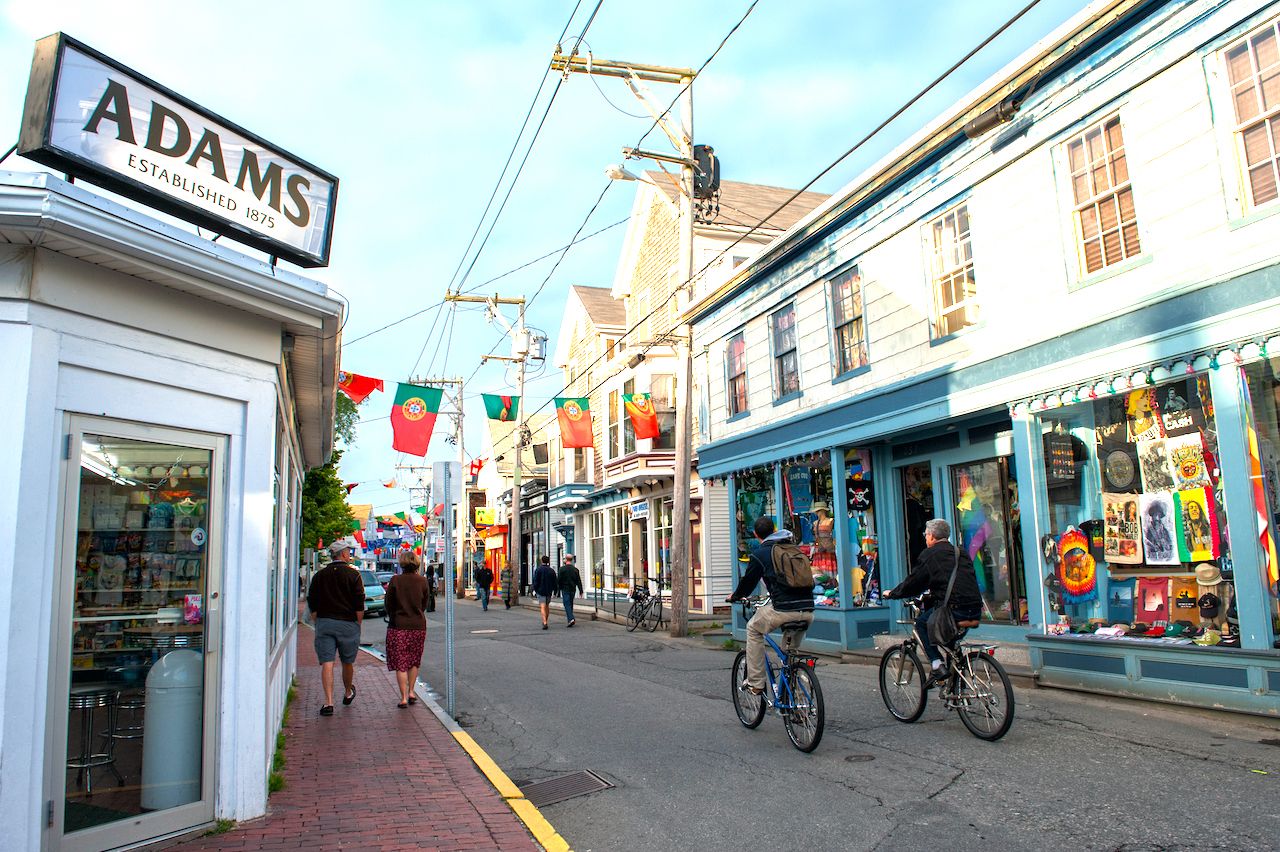
Photo: Rolf_52/Shutterstock
Before Adam Singer, the owner of Adam’s Nest, left Florida for Provincetown this spring, his parents asked, “Are you sure you want to go back?”
“This is my business, this is where my friends are, and this is where my life is,” thought Singer. “If this is the new normal, I have to go, and I have to figure out what it’s going to look like and adjust accordingly.”
His store – a collection of graphic tees, provocative art, and an assortment of other quirky-queer items is much more than a retail establishment. “I run a business with purpose,” Singer says proudly. By promoting a roster of LGBTQ artists, selling goods that celebrate queer culture, and donating a portion of his profits to charitable organizations like The Trevor Project and SAGE, Adam’s Nest has a reputation as one of the most sociopolitically-conscious retailers along Provincetown’s Commercial Street.
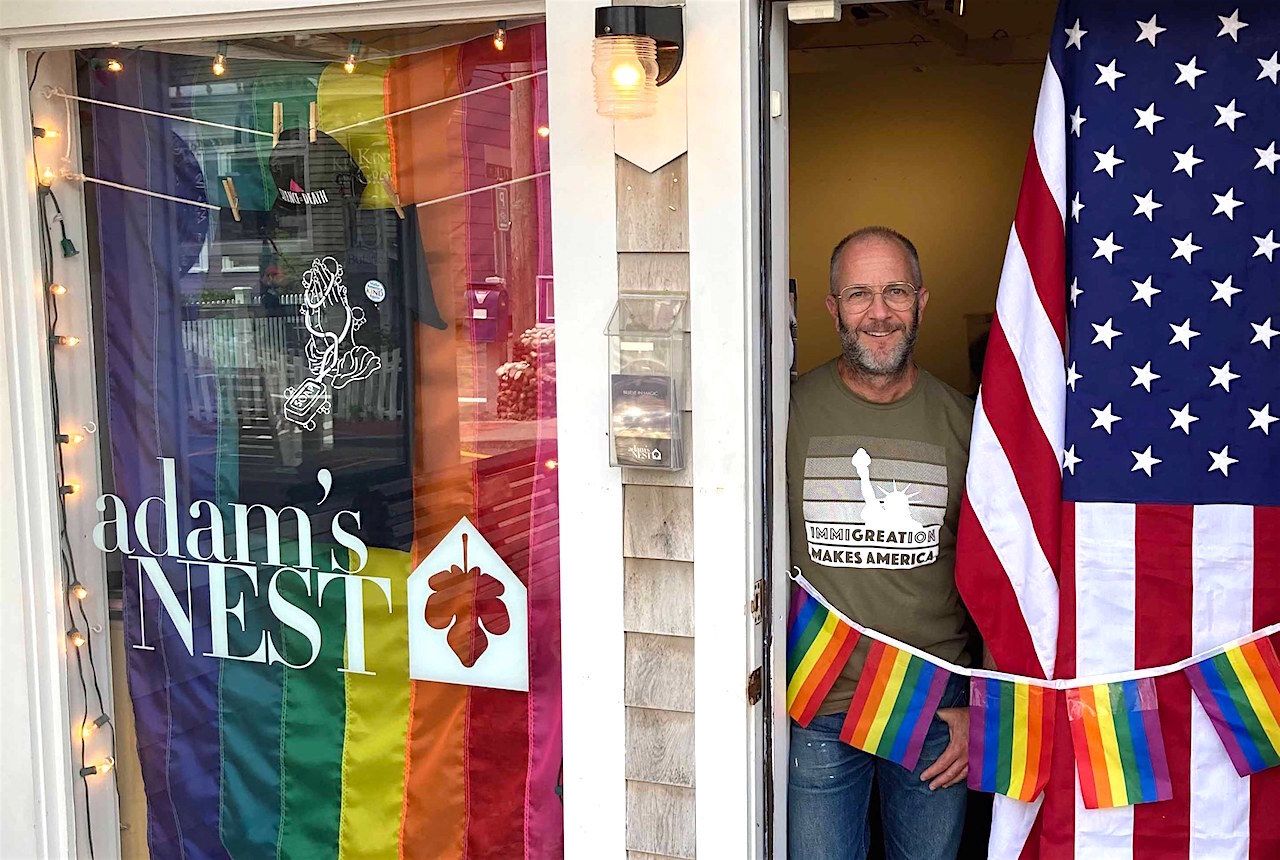
Photo: Adam’s Nest/Facebook
“When a mother comes in, has a conversation with you, and says, ‘Thank you for making the world a safer place for my trans child,’ I can’t put a price on it,” says Singer. “That’s the sort of conversation I have the luxury of having all summer long.”
Although there might be less of these conversations this summer – Singer’s shop is 180 square feet and can only capacitate two people at a time – Adam’s Nest is also a successful e-commerce business that will support him through the pandemic. As a result, Singer is still selling merchandise to support the local community.
“We did one collaboration with a queer street artist out in LA named Jeremy Novy to make a ‘Soap and Hope‘ graphic tee-shirt. One-hundred percent of the profits were donated to COVID-19 relief funds,” he says. A subsequent promotion benefited Provincetown charities, including Helping Our Women, AIDS Support Group of Cape Cod, the Provincetown Soup Kitchen, and Outer Cape Health Services.
Other businesses in the LGBTQ capital of Cape Cod haven’t been so fortunate. At the beginning of the season, “everyone was suffering,” says Anthony Fuccillo. “In a town that depends on tourism, businesses had to close. Inns lost entire reservations, and restaurants could only offer take-out until a few weeks ago.”
Following relaxed zoning laws, restaurants took to the streets to abide by state-mandated guidelines. Front Street, an Italian restaurant that never had outdoor seating before, now dines outside. Jimmy’s Hideaway put in a patio. Victor’s expanded its outdoor space. The Red Inn turned a cocktail space into a dining area.
Other businesses have met the pandemic’s demands by going virtual. Seth Rudetsky, the Broadway pundit who usually hosts a summer concert series at the Art House, is streaming his shows online. For anyone unable to check out Ptown’s exceptional array of art, they can take a virtual tour of over 30 galleries at the Ptown Gallery Stroll.
Hopefully, these modifications will be enough to keep the seaside Elysium afloat. “Most do their business in 10-12 weeks every year. If they don’t make it now, they’re not going to make it at all,” warns Fuccillo.
“If you love these places and you want them to survive, do what you can to support them,” pleads Singer. That may mean making a donation, buying gift cards, or shopping online.
Of course, if you adhere to physical distancing guidelines and wear a mask — even at the Dick Dock — Ptown is open for business. “Tea dance, that won’t be here,” Singer laments, “but if you come to Provincetown to go to the beach, walk the street, and go to the bike paths — that’s all there. That’s why I opened a business here.”